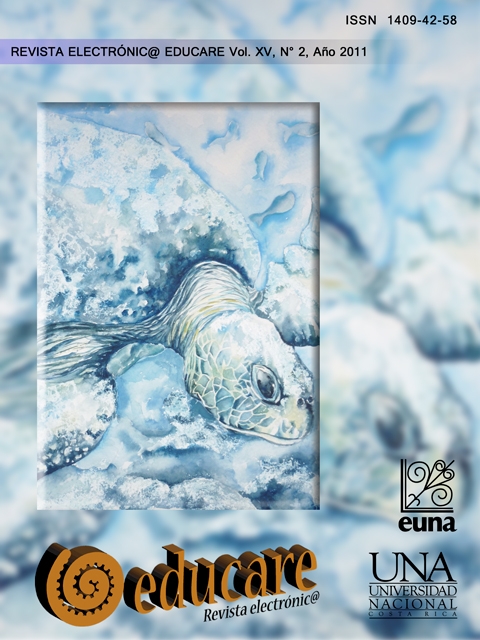The Social-Scientific Research: An Epistemological Discussion from Education
DOI:
https://doi.org/10.15359/ree.15-2.2Keywords:
Research, social-scientism, method, paradigmAbstract
The epistemological debate of social-scientific research has been, for years, to compare the methods used, trying to determine which one is more valuable, according to its theoretical basis. Although more recent proposals use hybrid methods or more diverse epistemological approaches, duality has prevailed. Descriptive or explanatory; phenomenology or positivist; classical or emergent; research paradigms are our way to access to the reality studied and obtain principles and answers. This defines the methods. Even when, it is possible to group and categorize these methods as quantitative and qualitative, the epistemological framework established by the structures of any methodology will allow approaching a phenomenon better than other, although, this does not necessarily make it definitely more valuable. Both quantitative and qualitative methods, in education, have helped to address phenomena, which has produced favorable results to benefit the education activity. This trial, which is the result of a literature review and a career in research and education, aims at clarifying the complex initial overview of new educational researchers, instead of reviewing an epistemological position.
References
Alonso, J. A. (2008). Metodología. México: Limusa.
Baranger, D. (2004). Los oficios del sociólogo (Cap. II) En D. Baranger (Aut.), Epistemología y
metodología en la obra de Pierre Bordieu (pp. 59-87). Buenos Aires: Prometeo.
Bertely, M. (2000). Conociendo nuestras escuelas: Un acercamiento etnográfico a la cultura
escolar. México: Paidós.
Casas, M. C. (1998). La fundamentación de una ciencia social autónoma. El pensamiento de
Durkheim: entre el mundo empírico y el simbólico. En R. Reséndiz (Coord.), El pensamiento
sociológico clásico (107-153). México: UNAM.
Cembranos, F., Montesinos, D. H. y Bustelo, M. (1989). El análisis de la realidad (Cap. II). En F.
Cembranos, D. H. Montesinos y M. Bustelo (aut.), La animación sociocultural. Una propuesta
metodológica (pp. 23-55). Madrid: Popular.
García, V. (1994). La investigación pedagógica y el principio de distinción y complementariedad.
En V. García (Coord.), Problemas y métodos de investigación en educación personalizada
(pp. 21-38). Madrid: Rialp.
Goetz, J. P y LeComte, M. D. (1988). Etnografía y diseño cualitativo en investigación educativa.
Madrid: Morata.
Hernández, R. (1991). Metodología de la investigación (3 ª ed.). México: McGraw-Hill
Laureiro, I. y Fernández R. (mayo, 2006). Resumen de La dialéctica materialista Vs. Los “Paradigmas”
de investigación cualitativa y cuantitativa. Ponencia presentada en la III Conferencia Internacional
“La obra de Carlos Marx y los desafíos del siglo XXI”. La Habana, Cuba.
Rodríguez, Gil y García (1996). Tradición y enfoques en la investigación cualitativa y métodos de
investigación cualitativa (Cap. I y II). En G. Rodríguez, J. Gil y García, E. (Aut.), Metodología
de la investigación cualitativa (pp. 1-35). Aljibe: Málaga
Rojas, R. (2001). Formación de investigadores educativos. Una propuesta de investigación (10ª ed.).
México: Plaza y Valdés
Taylor, S. J. y Bogdan, R. (1987). Introducción a los métodos cualitativos de investigación.
Barcelona: Paidós.
Valles, M. S. (1999). Técnicas cualitativas de investigación social. Reflexión metodológica y
práctica profesional. Madrid: Síntesis.
Van Dalen, D. B. y Meyer, W. J. (1988). Manual de técnica de la investigación educacional.
Argentina: Paidós.
Downloads
Published
How to Cite
Issue
Section
License
1. In case the submitted paper is accepted for publication, the author(s) FREELY, COSTLESS, EXCLUSIVELY AND FOR AN INDEFINITE TERM transfer copyrights and patrimonial rights to Universidad Nacional (UNA, Costa Rica). For more details check the Originality Statement and Copyright Transfer Agreement
2. REUTILIZATION RIGHTS: UNA authorizes authors to use, for any purpose (among them selfarchiving or autoarchiving) and to publish in the Internet in any electronic site, the paper´'s final version, both approved and published (post print), as long as it is done with a non commercial purpose, does not generate derivates without previous consentment and recognizes both publisher's name and authorship.
3. The submission and possible publication of the paper in the Educare Electronic Journal is ruled by the Journal’s editorial policies, the institutional rules of Universidad Nacional and the laws of the Republic of Costa Rica. Additionally, any possible difference of opinion or future dispute shall be settled in accordance with the mechanisms of Alternative Dispute Resolution and the Costa Rican Jurisdiction.
4. In all cases, it is understood that the opinions issued are those of the authors and do not necessarily reflect the position and opinion of Educare, CIDE or Universidad Nacional, Costa Rica. It is also understood that, in the exercise of academic freedom, the authors have carried out a rogorous scientific-academic process of research, reflection and argumentation thar lays within the thematic scope of interest of the Journal.
5. The papers published by Educare Electronic Journal use a Creative Commons License:














 The articles published by Educare Electronic Journal can be shared with a Creative Commons License:
The articles published by Educare Electronic Journal can be shared with a Creative Commons License: 



